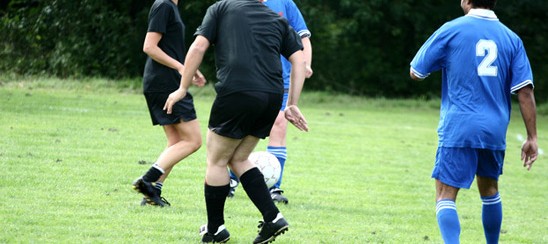Working Together?
While there are benefits to both team and individual sport, they differ vastly. In team sports, success or failure in competition depends on many variables. With few exceptions, it doesn’t matter which team has the best player, the final result hinges on the entire team. This principle is best exemplified by three-time FIFA player of the year, Lionel Messi, whose club results outperform his national team outcomes. The same player achieves more with a better supporting cast at Barcelona.
No matter your talent level in team sport, you must rely on your teammates.
Likewise, team sports promote the virtue of working together. Without a group of players performing simultaneously complex motions pointed toward the same goal, the team performance will falter.
Consider a perfectly executed fade route in football. The team must be on the same page regarding snap count or else the play will be blown dead as a penalty. Once the ball is snapped, the team relies on multiple variables for a successful play. First, the offensive line must protect the quarterback. Each lineman needs to communicate responsibilities and effectively neutralize the opponent’s pass rush. Simultaneously, the quarterback must control the snap, read the defense, and deliver a pinpoint throw to the wide receiver. Lastly, it is necessary for the receiver to separate from his defender, run a precise route to position himself perfectly for a throw, and catch the pass.
Only when these variables align does a successful play emerge. The teammates must work together to achieve this result. Everyone has an assignment and is expected to execute their task effectively. Any failure of this teamwork results in an unsuccessful play. As we all know, there is no “I” in team.
Or the Lone Wolf?
On the other end of sport lies individual competition. Vastly different from team sport, individual sport requires a different set of dynamics that govern success. In an individual sport, you are your competition. Every competitive opportunity is a chance to beat your personal best. To achieve these results, you need a high amount of self reliance, discipline, focus and passion.
Just as team sports diminish the impact of the best players, it also masks the influence of the worst players. Even though some might say you’re only as good as your weakest link, this cliche is not necessarily true. Look at how Peyton Manning carried some mediocre Indianapolis Colts teams in the last decade. Not every player provides the same amount of influence on a competitive result.
But with individual sport, you can’t hide behind teammates. Success and failure are yours alone to bear. Where you can rely on a teammate in team sports, you must rely on yourself in individual sport. You can’t provide a substitute golfer for your putting game; you can’t bring in a teammate to serve the ball in singles tennis. The burden of your performance lies on you alone.
While individual sports promote a higher amount of discipline, research has indicated that people find team sports more enjoyable.
These findings suggest that athletes in individual sports are more likely to struggle through low times in training. In these times, you don’t feel like pushing yourself to achieve just a little more. Success in individual sports requires a high level of discipline to keep yourself accountable and to push through the less exciting times in your sport.
Interestingly, studies suggest that team competition increases performance level. Is it possible that athletes training for individual sport could improve performance by shifting into a team-oriented training?
Nevertheless, self reliance and discipline are virtues worth fostering in athletes of individual sport.
Depending on the sport you play, you will find success by understanding these key principles. In team sport, working together and relying on teammates are qualities worth fostering. Additionally in individual sport, the ability to rely on yourself and a discipline to keep yourself accountable are critical for success. Regardless of the sport, the challenge is to stay focused and goal oriented. The only person to drive that conversation is you.
How can you foster these qualities to better your sport?



